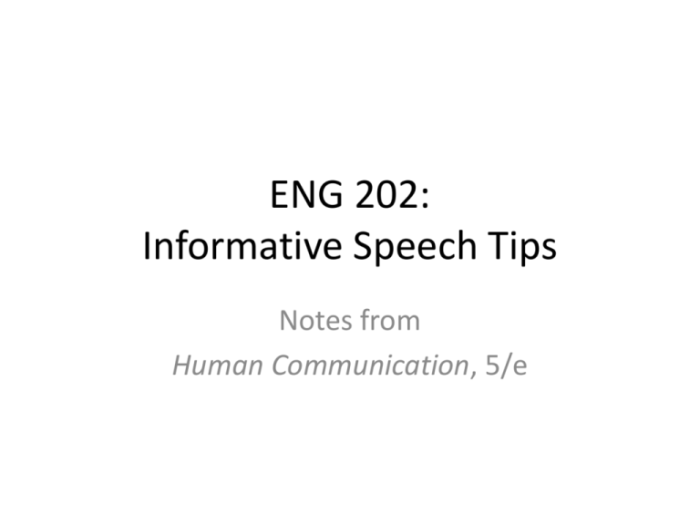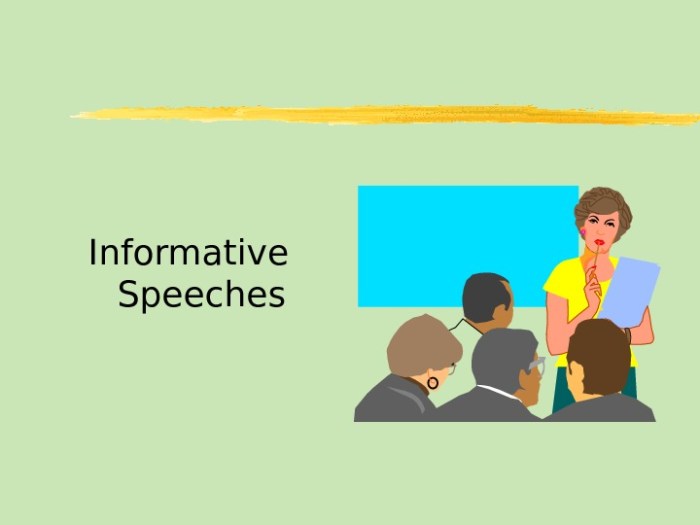Informative speeches must be accurate clear and interesting for listeners – Informative speeches must be accurate, clear, and interesting for listeners to be effective in conveying information and engaging the audience. Accuracy ensures the reliability of the information presented, clarity facilitates understanding, and engagement maintains attention and interest throughout the speech.
This Artikel explores the importance of accuracy, clarity, and engagement in informative speeches, providing practical tips and strategies for delivering informative and impactful presentations.
Accuracy in Informative Speeches

Accuracy is paramount in informative speeches. Presenting accurate information builds trust with the audience and ensures that they leave with a clear understanding of the topic. Inaccurate information, on the other hand, can mislead the audience and undermine the speaker’s credibility.
Verifying Sources and Avoiding Bias, Informative speeches must be accurate clear and interesting for listeners
- Verify the accuracy of all information presented in the speech, ensuring that it comes from reliable and credible sources.
- Be aware of potential biases in the sources and present multiple perspectives to provide a balanced view.
Consequences of Presenting Inaccurate Information
- Loss of audience trust and credibility
- Misinformed audience
- Potential legal or ethical consequences
Clarity in Informative Speeches

Clarity is essential for effective informative speeches. When information is presented clearly, the audience can easily understand and retain it. Unclear communication, on the other hand, can confuse the audience and make it difficult for them to follow the speech.
Common Sources of Unclear Communication
- Unorganized and rambling structure
- Technical jargon or overly complex language
- Lack of signposting or transitions
Tips for Organizing and Structuring Information
- Organize the speech into a logical and coherent structure.
- Use signposting and transitions to guide the audience through the speech.
- Break down complex concepts into smaller, more manageable chunks.
Engaging Informative Speeches

Engaging informative speeches captivate the audience and make them want to listen. By using engaging techniques, speakers can keep the audience’s attention and make the speech more memorable.
Techniques for Capturing and Maintaining Attention
- Use storytelling and personal anecdotes to make the information relatable.
- Incorporate interactive elements, such as questions or activities, to involve the audience.
- Use humor or visuals to lighten the mood and make the speech more enjoyable.
Structure of Informative Speeches: Informative Speeches Must Be Accurate Clear And Interesting For Listeners

The structure of an informative speech provides a framework for organizing and delivering the information. A well-structured speech helps the audience follow the speech and retain the information.
Typical Structure of an Informative Speech
| Section | Purpose |
|---|---|
| Introduction | Grabs attention, introduces the topic, and provides an overview of the speech. |
| Body | Presents the main points of the speech in a logical and coherent order. |
| Conclusion | Summarizes the main points, restates the thesis, and leaves a lasting impression on the audience. |
Quick FAQs
What are the common sources of unclear communication in speeches?
Common sources of unclear communication include disorganized structure, excessive jargon, lack of visual aids, and rapid speech.
How can speakers capture and maintain audience attention during an informative speech?
Speakers can capture and maintain audience attention by using storytelling, personal anecdotes, humor, interactive elements, and varying their delivery style.